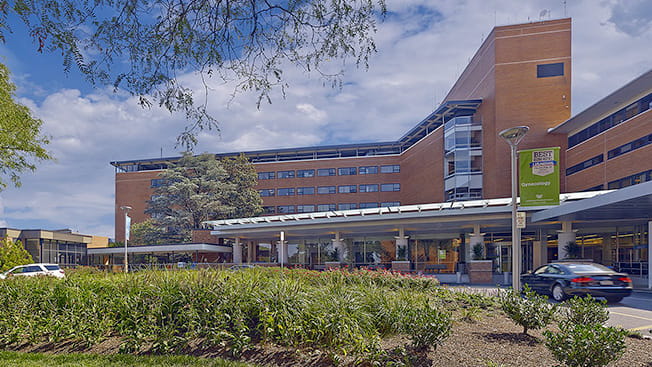Main Line Health researchers find that changes in treatment increased anxiety for breast cancer patients amid pandemic, and Main Line Health physicians respond to this patient need


The COVID-19 pandemic forced medical centers nationwide to delay or change course on treatment for many breast cancer patients. A new study by Main Line Health researchers has taken an in-depth look at the issue, finding the pandemic caused wide-ranging effects.
About 44% of patients saw changes to their breast cancer treatment plan due to the pandemic, according to the study led by the Center for Population Health Research at the Lankenau Institute for Medical Research (LIMR), part of Main Line Health. Regardless of whether their plan was altered, nearly 1 in 3 experienced elevated levels of anxiety and depression.
The study involved patients who needed medical evaluation or had a scheduled surgery date at Lankenau Medical Center or Bryn Mawr Hospital, two acute-care hospitals under Main Line Health, a community-based health system providing multidisciplinary breast cancer care throughout the Philadelphia region.
“This data is relevant to cancer care across the U.S. especially as we are now seeing an increase in COVID cases,” said lead author Kaitlyn Kennard, a postdoctoral fellow for LIMR and Lankenau Medical Center surgical resident. “More than 75% of surgical care for breast cancer nationally is delivered in community hospitals. That means Main Line Health’s experience with the impact of COVID-19 reflects the majority of breast cancer care.”
Data was collected during the initial COVID-19 surge from March to June 2020. Surgery at the time was limited to essential cases. Established patients were seen via telemedicine. The study found 32 of the 73 enrolled patients (44%) had changes to their care. Changes included delay in therapy (15%) and use of hormonal therapy (29%) to compensate for delays in surgery. The median time to surgery for patients whose cases could not wait was 24 days.
Additionally, a survey showed nearly one-third of patients reported higher anxiety and depression. Those levels were similar regardless of whether the patient had a change in care or not. However, more than 55% of those with changes in care said they believed COVID-19 affected their treatment outlook.
“This study reinforces that we should have plans in place to meet the needs of patients with all types of cancer in the case of an emergent situation,” said Sharon Larson, executive director of the Center for Population Health Research and a study coauthor.
“Since the initial COVID-19 surge, we have been diligently working to address the pandemic’s impact on Main Line Health cancer patients,” said Michael Walker, MD, medical director, Main Line Health Cancer Care. “We have developed programs and services to help our patients through this challenging time.”
Walker cited creating online support groups and webinars, ensuring easy access to telemedicine, and providing early access to vaccines as examples of how the health system strived to serve patients and ease their anxiety.
“Main Line Health breast cancer nurse navigators have always been by a patient’s side throughout testing, diagnosis and treatment, and they came up with innovative ways to continue this support, which was needed more than ever,” Walker said.
The study, “COVID-19 Pandemic: Changes in Care for a Community Academic Breast Center and Patient Perception of Those Changes,” is in the September issue of Annals of Surgical Oncology.
About Lankenau Institute for Medical Research
Lankenau Institute for Medical Research (LIMR) is a nonprofit biomedical research institute located on the campus of Lankenau Medical Center and is part of Main Line Health. Founded in 1927, LIMR's mission is to improve human health and well-being. Using its ACAPRENEURIALTM organizational model that integrates academic and entrepreneurial approaches, faculty and staff are devoted to advancing innovative new strategies to address formidable medical challenges including cancer, cardiovascular disease, tissue regeneration, gastrointestinal disorders and autoimmune diseases such as rheumatoid arthritis. LIMR's principal investigators conduct basic, preclinical and clinical research, using their findings to explore ways to improve disease detection, diagnosis, treatment and prevention. They are committed to extending the boundaries of human health through technology transfer and training of the next generation of scientists and physicians.
About Main Line Health
Founded in 1985, Main Line Health® is a not-for-profit health system serving the Philadelphia region and beyond. Main Line Health consists of five hospitals, seven health centers and over 150 medical practice locations. The System has more than 14,000 employees and over 2,100 employed and independent physicians and advanced practice providers.
At its core are four of the region's most respected acute care hospitals — Lankenau Medical Center, Bryn Mawr Hospital, Paoli Hospital and Riddle Hospital — as well as one of the nation's premier facilities for rehabilitative medicine, Bryn Mawr Rehab Hospital. Main Line Health also includes Mirmont Treatment Center for drug and alcohol recovery; Main Line Health HomeCare & Hospice, providing skilled home healthcare and hospice services; Main Line Health Centers, primary and specialty care, lab and radiology and other outpatient services located in Broomall, Collegeville, Concordville, Devon, Exton, King of Prussia and Newtown Square; and Lankenau Institute for Medical Research, a biomedical research organization.
Main Line Health's medical staff benefits from a collaborative relationship including independent physicians, community healthcare professionals and hospital-based experts from Main Line HealthCare, the employed multi-specialty physician network of Main Line Health.
Main Line Health collaborates with top experts to deliver exceptional specialty care. Through our affiliation with the Children's Hospital of Philadelphia, doctors and advanced practice providers care for pediatric patients at select Main Line Health locations, including the neonatal intensive care units at Main Line Health's four acute care hospitals, as well as Bryn Mawr Hospital's Inpatient Pediatric Unit and Emergency Department. Jefferson Health neurosurgeons and neurointerventionalists provide 24/7 specialized care, including neurointervention and lifesaving stroke care, and trauma surgeons provide critical care to our patients. Through our affiliation with Sheppard Pratt — a nonprofit provider of mental health services, substance use, developmental disability and other comprehensive behavioral health support — patients receive compassionate care in a welcoming environment.
For more information, visit mainlinehealth.org and connect with us on social media:
LinkedIn: www.linkedin.com/company/main-line-health
Facebook: www.facebook.com/mainlinehealth
X (formerly known as Twitter): www.twitter.com/mainlinehealth
Instagram: www.instagram.com/mainlinehealth
Contact
Phil Ellingsworth, Jr.Director, Communications
Office: 484.580.1182
EllingsworthPh@mlhs.org